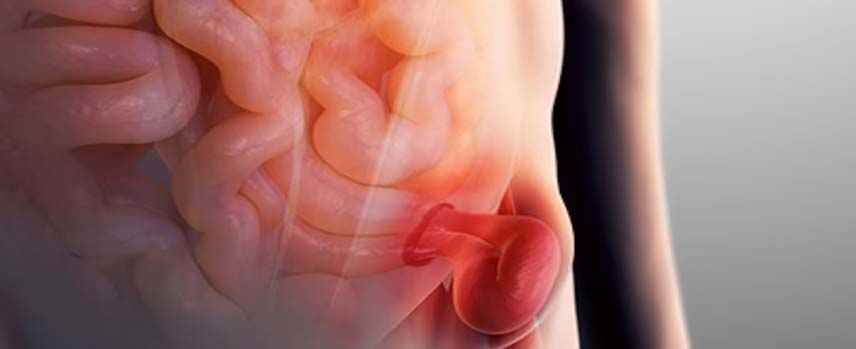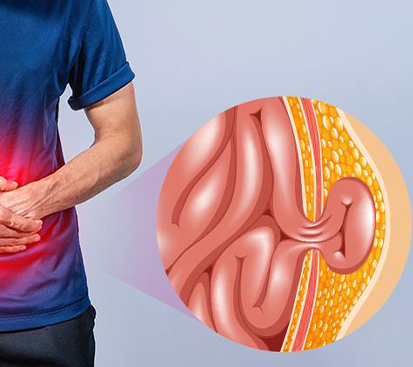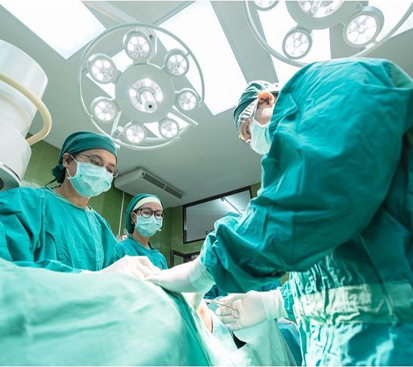
Hernia is a common medical condition that occurs when an organ or tissue pushes through a weakened area in the abdominal muscles, leading to discomfort, pain, and potential complications. Hernias do not resolve on their own and often require surgical intervention to prevent worsening conditions. Common types of hernias include Inguinal Hernia, Umbilical Hernia, Paraumbilical Hernia, and Incisional Hernia. Early diagnosis and timely treatment are essential to prevent complications such as strangulation, which can cut off blood supply to the herniated tissue and lead to severe health risks.
If left untreated, a hernia may grow larger and become more painful, interfering with daily activities. In severe cases, it can lead to intestinal obstruction or strangulation, requiring emergency surgery. Typical symptoms include a noticeable bulge, pain while lifting, discomfort during movement, and pressure in the affected area. Seeking immediate medical attention can help prevent further complications and ensure timely intervention.
Treatment for hernias usually involves surgical repair, known as herniorrhaphy or hernioplasty. In most cases, laparoscopic hernia surgery is preferred, as it is a minimally invasive procedure that ensures a quicker recovery with minimal scarring. For larger or more complex hernias, open surgery may be required to reinforce the weakened abdominal wall. In some cases, a mesh is used to provide additional support and reduce the risk of recurrence.

Hernia symptoms can start as mild discomfort and gradually worsen over time. Initially, a person may notice a small bulge that becomes more prominent when standing, coughing, or straining. Over time, the bulge may enlarge, leading to pain and discomfort, especially during physical activity. Recognizing these early warning signs can help in seeking prompt medical care before complications arise. Other symptoms such as nausea, pressure, and digestive discomfort may also accompany the hernia, indicating the need for immediate medical attention.
Ignoring these symptoms may lead to strangulation, where the herniated tissue loses its blood supply, resulting in severe pain, tissue damage, and possible infection. This condition requires emergency surgery to prevent severe complications. Delaying treatment can increase the risk of complications, leading to prolonged recovery and additional medical interventions. Seeking immediate medical attention ensures effective treatment and a quicker recovery.
Hernia repair is necessary when symptoms worsen or when there is a risk of complications. While some small hernias can be managed with lifestyle modifications and supportive measures, surgery is required if the hernia becomes painful, increases in size, or affects daily activities. The type of surgery recommended depends on the location and severity of the hernia. Laparoscopic hernia surgery is a preferred option for its minimally invasive approach, ensuring faster recovery and reduced post-operative pain. For more complex cases, open surgery may be necessary to repair the weakened abdominal wall and reinforce it with a mesh.


If surgery is needed, we provide laparoscopic hernia repair, a minimally invasive procedure that ensures faster recovery, minimal scarring, and reduced post-operative pain. This advanced surgical technique involves small incisions, reducing the risk of complications and promoting a quicker healing process. Our specialized surgical team ensures precise and safe hernia repair, minimizing discomfort during recovery. Post-surgery, patients receive personalized care, including pain management, physical activity guidance, and dietary recommendations, to support a smooth and speedy recovery.
Accurate diagnosis is crucial for effective hernia treatment. Our specialists perform a thorough medical evaluation, including a detailed review of symptoms, physical examination, and advanced imaging tests such as ultrasound or CT scan. These diagnostic methods help in determining the severity of the condition and ruling out other abdominal issues. Early and precise diagnosis allows for timely medical intervention, reducing the risk of complications like strangulation or obstruction. Based on the findings, our experts recommend the most appropriate treatment plan, whether it be non-surgical management for minor cases or immediate surgical repair for severe hernias.
- Physical examination to check for hernia bulge and tenderness
- Ultrasound or CT scan for precise evaluation of the hernia
- Lifestyle modification and supportive measures for mild cases
- Surgical repair using laparoscopic or open techniques for larger or symptomatic hernias
- Post-surgical care, including pain management and activity modifications

Our advanced hernia treatment and surgery options ensure safe and effective management of the condition. With expert surgeons and state-of-the-art facilities, we provide precise diagnosis and tailored treatment plans to suit each patient’s needs. Our minimally invasive laparoscopic hernia repair reduces recovery time, minimizes scarring, and ensures less post-operative discomfort. From initial consultation to post-surgical care, we prioritize patient safety, comfort, and a smooth recovery, helping you return to normal life as quickly as possible.